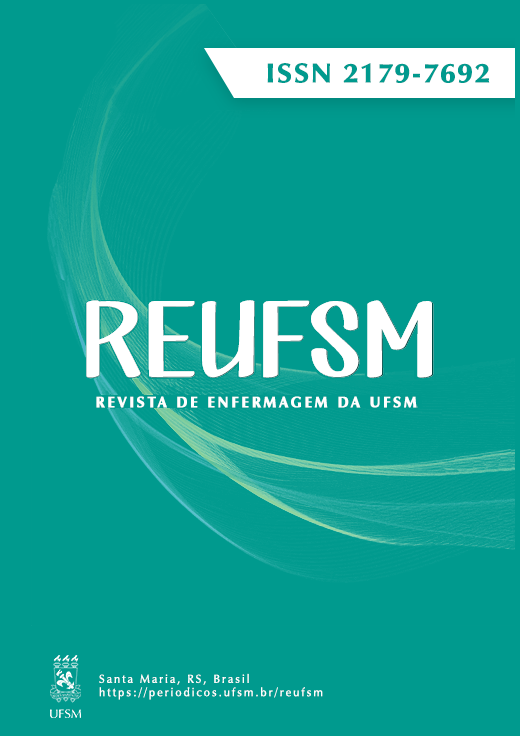Nurses’ and physicians’ knowledge and perceptions regarding pregnant women’s referral to maternity care
DOI:
https://doi.org/10.5902/2179769286641Keywords:
Obstetrics, Maternal and Child Health, Hospitals, Maternity, Complications in pregnancy, ParturitionAbstract
Objective: To understand the knowledge and perceptions of nurses and physicians working in obstetrics regarding the strategy of referring pregnant women to a designated maternity care facility. Method: A qualitative study was conducted with 17 professionals from a hospital in southern Brazil. Data collection took place in 2022 through a questionnaire followed by thematic analysis. Results: Participants perceive the referral of pregnant women to a maternity facility as a strategy that helps reduce anxiety and fear related to the childbirth process. They noted challenges in implementing this strategy, particularly due to recent changes in public policy and access barriers to maternity care caused by social vulnerability. Conclusion: There are challenges in effectively implementing maternity referrals related to staffing issues. Integrated actions within the Brazilian health care network are essential to ensure proper maternal care.
Downloads
References
Costa JBO, Alcântra MR, Santos DV, Souza DC. Para uma vinda bem-vinda: a visita à maternidade como uma prática humanizada no Sistema Único de Saúde (SUS). In: Alves GSB, Oliveira E. Tópicos em Ciências da Saúde. Belo Horizonte: Poisson; 2021. Vol. 22; p. 15-8. doi: 10.36229/978-65-5866-061-3.CAP.02.
Medeiros SNO, Caetano AA, Santos DS, Lima LNF, Alves JPC, Fonseca SCT, et al. Acolher: Visita guiada de gestantes à maternidade da região do bico do papagaio. Rev Extensão [Internet]. 2023 set 04 [acesso em 2023 set 20];7(3):61-6. Disponível em: https://revista.unitins.br/index.php/extensao/article/view/8763.
DATASUS. Departamento de Informática do Sistema Único de Saúde do do Brasil [Internet]. 2023 [acesso em 2024 ago 24]. Disponível em: http://tabnet.datasus.gov.br/cgi/tabcgi.exe?sinasc/cnv/nvuf.def.
BRASIL. Presidência da República. Lei nº 11.634, de 27 de dezembro de 2007. Dispõe sobre o direito da gestante ao conhecimento e a vinculação à maternidade onde receberá assistência no âmbito do Sistema Único de Saúde. Brasília, DF: Presidência da República, 2007. Disponível em: https://www.planalto.gov.br/ccivil_03/_Ato2007-2010/2007/Lei/L11634.htm. Acesso em: 20 set. 2023.
Ministério da Saúde (BR). Secretaria de Atenção Primária à Saúde. Departamento de Ações Programáticas. Manual de gestação de alto risco [Internet]. Brasília, DF: Ministério da Saúde, 2022 [acesso em 2022 set 01]. Disponível em: https://portaldeboaspraticas.iff.fiocruz.br/atencao-mulher/manual-de-gestacao-de-alto-risco-ms-2022/.
Moraes LMV, Simões VMF, Carvalho CA, Batista RFL, Britto e Alves MTSS, Thomaz EBAF, et al. Factors associated with the involuntary pilgrimage for childbirth care in São Luís (Maranhão State) and Ribeirão Preto (São Paulo State), Brazil: a contribution from the BRISA cohort. Cad Saúde Pública. 2018;34(11):e00151217. doi: 10.1590/0102-311X00151217.
Souza VRS, Marziale MHP, Silva GTR, Nascimento PL. Tradução e validação para a língua portuguesa e avaliação do guia COREQ. Acta Paul Enferm. 2021;34:eAPE02631. doi: 10.37689/acta-ape/2021AO02631.
Ribeiro J, Souza FN, Lobão C. Editorial: saturação da Análise na investigação qualitativa: quando parar de recolher dados? Rev Pesqui Qual [Internet]. 2018 [acesso em 2023 set 20];6(10):iii-vii. Disponível em: https://editora.sepq.org.br/rpq/article/view/213.
Minayo MCS. Análise qualitativa: teoria, passos e fidedignidade. Ciênc Saúde Colet. 2012;17(3):621-6. doi: 10.1590/S1413-81232012000300007.
Rosa LS, Mackedanz LF. A análise temática como metodologia na pesquisa qualitativa em educação em ciências. Rev Atos Pesqui Educ. 2021;16:e8574. doi: 10.7867/1809-0354202116e8574.
Livramento DVP, Backes MTS, Damiani PR, Castillo LDR, Backes DS, Simão AMS. Perceptions of pregnant women about prenatal care in primary health care. Rev Gaúcha Enferm. 2019;40:e20180211. doi: 10.1590/1983-1447.2019.20180211.
Tomasi E, Fernandes PAA, Fischer T, Siqueira FCV, Silveira DS, Thumé T, et al. Qualidade da atenção pré-natal na rede básica de saúde do Brasil: indicadores e desigualdades sociais. Cad Saúde Pública. 2017;33(3):e00195815. doi: 10.1590/0102-311X00195815.
Marques BL, Tomasi YT, Saraiva SS, Boing AF, Geremia DS. Orientações às gestantes no pré-natal: a importância do cuidado compartilhado na atenção primária em saúde. Esc Anna Nery. 2021;25(1):e20200098. doi: 10.1590/2177-9465-EAN-2020-0098.
Viellas EF, Domingues RMSM, Dias MAB, Gama SGN, Theme Filha MM, Costa JV, et al. Assistência pré-natal no Brasil. Cad Saúde Pública. 2014;30:S85-100. doi: 10.1590/0102-311X00126013.
Soa AC, Moreno MCC, González IM. Teoría de los sistemas de enfermería en la prevención del bajo peso al nacer, roles y funciones de enfermería en atención primaria de salud. Int J Med Surg Sci. 2021;8(1):1-10. doi: 10.32457/ijmss.v8i1.631.
BRASIL. Ministério da Saúde. Portaria nº 2.351, de 5 de outubro de 2011. Altera a Portaria nº 1.459/GM/MS, de 24 de junho de 2011, que institui, no âmbito do Sistema Único de Saúde (SUS), a Rede Cegonha. Brasília, DF: Ministério da Saúde, 2011. Disponível em: https://bvsms.saude.gov.br/bvs/saudelegis/gm/2011/prt2351_05_10_2011.html. Acesso em: 20 set. 2023.
BRASIL. Ministério da Saúde. Portaria Nº 904, de 29 de maio de 2013. Estabelece diretrizes para implantação e habilitação de Centro de Parto Normal (CPN), no âmbito do Sistema Único de Saúde (SUS), para o atendimento à mulher e ao recém-nascido no momento do parto e do nascimento, em conformidade com o Componente PARTO E NASCIMENTO da Rede Cegonha, e dispõe sobre os respectivos incentivos financeiros de investimento, custeio e custeio mensal. Brasília, DF: Ministério da Saúde, 2013.
[Internet]. 2021[Cited 2022 set 01]; 20. doi: 10.4025/ciencuidsaude.v20i0.58622
Leal MC, Esteves-Pereira AP, Viellas EF, Domingues RMSM, Gama SGN. Assistência pré-natal na rede pública do Brasil. Rev Saúde Pública. 2020;54:8. doi: 10.11606/s1518-8787.2020054001458.
Amorim TS, Backes MTS, Carvalho KM, Santos EKA, Dorosz PAE, Backes DS. Gestão do cuidado de Enfermagem para a qualidade da assistência pré-natal na Atenção Primária à Saúde. Esc Anna Nery. 2022;26. doi: 10.1590/2177-9465-EAN-2021-0300.
Amorim TS, Backes MTS, Santos EKA, Cunha KS, Collaço VS. Obstetric/neonatal care: expansion of nurses’ clinical practice in Primary Care. Acta Paul Enferm. 2019;32(4):358-64. doi: 10.1590/1982-0194201900050.
Sanfelice CFO, Mata JAL, Baraldi NG. Planned home birth and the COVID-19 pandemic: a necessary reflection. Online Braz J Nurs. 2022;21(Suppl 2). doi: 10.17665/1676-4285.20226556.
Joaquim RHVT, Dittz ES, Leão A, Madalena CM, Costa PR, Azevedo L, et al. Maternidade em tempos de pandemia de Covid-19: o que nos revelam as mães atendidas em um hospital de referência. Interface (Botucatu). 2022;26:e210785. doi: 10.1590/interface.210785.
Downloads
Published
How to Cite
Issue
Section
License
Copyright (c) 2024 Revista de Enfermagem da UFSM

This work is licensed under a Creative Commons Attribution 4.0 International License.
This work is licensed under a Creative Commons Attribution-NonCommercial-ShareAlike 4.0 International License.








